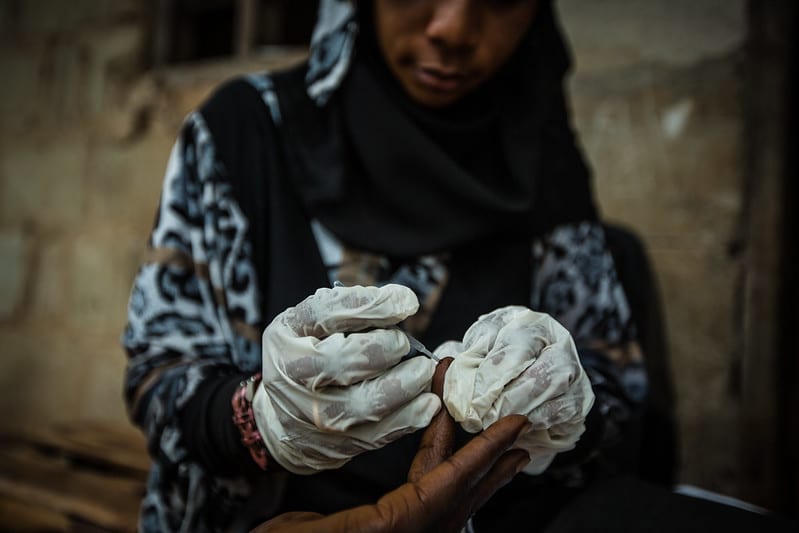Distrust among health care providers in the Democratic Republic of Congo of rapid diagnostic tests for malaria needs to be combatted to ensure that people aren’t being over-treated, that antimalarials aren’t overused and that people with fevers and negative malaria tests are properly treated for what is wrong with them.
These findings come from Johns Hopkins Center for Communication Programs researchers asked to uncover the reasons for an over-reporting of positive malaria cases in the country. There’s a discrepancy between test positivity rates reported from health facilities to a national database, and data collected from mechanical Deki readers, which automatically interpret and transmit rapid test results to DRC health officials. Measure Malaria, a project sponsored by the U.S. President’s Malaria Initiative (PMI), found over-reporting of positive rapid test results of 27 percent to 118 percent, depending on the province, in 2022.
To gain a greater understanding of the situation, CCP interviewed more than 200 health providers and community members.
CCP’s Kathryn Sugg, a research officer on the Breakthrough ACTION project who worked on this study, says that while people should quickly go to a health facility to be tested for malaria when they or their children have fevers, some just assume the fever is malaria and instead of getting tested, they go to pharmacists or traditional healers for antimalarial medications directly. Others, assuming they have malaria, won’t believe the accuracy of a negative test and insist on getting antimalarials anyway.
“There’s much less trust in the negative rapid diagnostic test result than there is in the positive one,” Sugg says. “So how can we educate the public and health care providers how important it is to only treat malaria cases that are found to be positive, not everyone who appears with a fever?”
A rapid diagnostic test for malaria is simple, using a finger prick to yield four drops of blood and with a result available after 15 minutes. It can easily detect whether the parasite that causes malaria is present and, if so, a patient can be given medications and sent home to rest. The tests are considered highly accurate, detecting between 92 and 100 percent of positive malaria cases. It’s what happens when the test is negative that worries researchers.
In some cases, providers themselves don’t trust the negative result and will offer antimalarial drugs anyway. In other cases, patients with negative results are the ones who insist on medication. Patients themselves who test negative may seek out another clinic or go to the pharmacist or healer. If antimalarials are used when they are not needed, it can contribute to resistance to these medications down the road.
“If I went to a center and they gave me negative results, while I can see that the child has malaria symptoms, I will find another center,” one focus group participant told researchers. “If there too they give me the same results, I will believe the provider because the same symptoms of malaria could also belong to another disease. In that case, I would trust the provider.”
Fever could signify any number of illnesses aside from malaria, including typhoid fever and other serious ailments.
Meanwhile, Sugg says, there is a need to increase understanding of rapid malaria tests and what the results mean, even among providers.
“Providers often aren’t confident in the tests, and that can trickle down to the patient,” Sugg says. “Whereas if the provider is very strongly confident in the test, and they say, ‘Well, you don’t have malaria, this test shows you don’t have malaria, we’re going to test for something else, or I’m going to give you, you know, medication for something else.’ But we have providers who would say, ‘Well, if I don’t give them antimalarials, they’ll just go get them somewhere else.’ So, it perpetuates a cycle of distrust.”
Sugg says better education can occur at many levels. Those who are trained on the latest in rapid diagnostic tests could bring materials back to the clinic to train other personnel. There’s a need to fight misinformation that suggests that if someone is self-medicating (though still sick) it means the test didn’t catch the parasite because the medication worked. Community messages could be tweaked, too, she says, to account for these misperceptions, explaining to people that self-treating for malaria could lead them to miss a deadly typhoid diagnosis.
“We can’t just assume that every fever is malaria,” she says. “Let’s find some trusted providers who can talk about their own experience with other diseases and with adhering to rapid diagnostic test results.”





